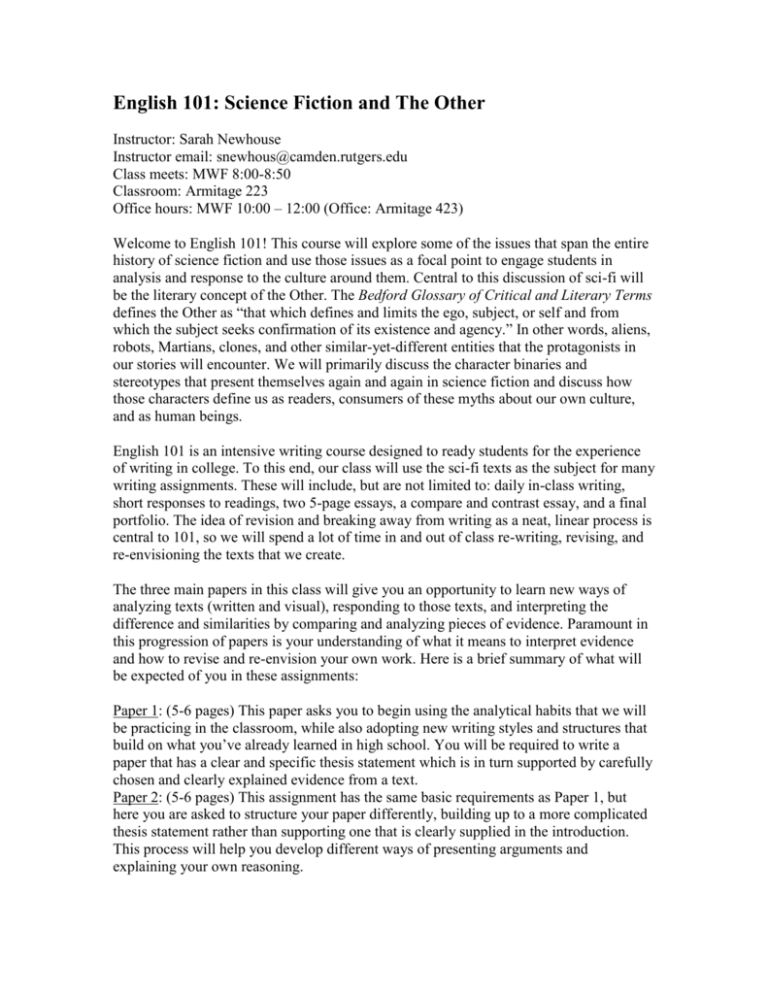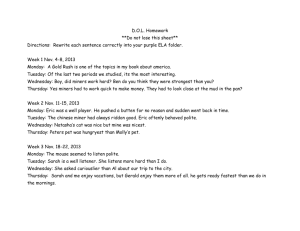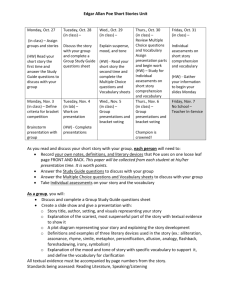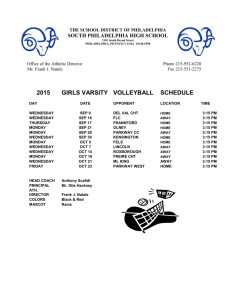
English 101: Science Fiction and The Other
Instructor: Sarah Newhouse
Instructor email: snewhous@camden.rutgers.edu
Class meets: MWF 8:00-8:50
Classroom: Armitage 223
Office hours: MWF 10:00 – 12:00 (Office: Armitage 423)
Welcome to English 101! This course will explore some of the issues that span the entire
history of science fiction and use those issues as a focal point to engage students in
analysis and response to the culture around them. Central to this discussion of sci-fi will
be the literary concept of the Other. The Bedford Glossary of Critical and Literary Terms
defines the Other as “that which defines and limits the ego, subject, or self and from
which the subject seeks confirmation of its existence and agency.” In other words, aliens,
robots, Martians, clones, and other similar-yet-different entities that the protagonists in
our stories will encounter. We will primarily discuss the character binaries and
stereotypes that present themselves again and again in science fiction and discuss how
those characters define us as readers, consumers of these myths about our own culture,
and as human beings.
English 101 is an intensive writing course designed to ready students for the experience
of writing in college. To this end, our class will use the sci-fi texts as the subject for many
writing assignments. These will include, but are not limited to: daily in-class writing,
short responses to readings, two 5-page essays, a compare and contrast essay, and a final
portfolio. The idea of revision and breaking away from writing as a neat, linear process is
central to 101, so we will spend a lot of time in and out of class re-writing, revising, and
re-envisioning the texts that we create.
The three main papers in this class will give you an opportunity to learn new ways of
analyzing texts (written and visual), responding to those texts, and interpreting the
difference and similarities by comparing and analyzing pieces of evidence. Paramount in
this progression of papers is your understanding of what it means to interpret evidence
and how to revise and re-envision your own work. Here is a brief summary of what will
be expected of you in these assignments:
Paper 1: (5-6 pages) This paper asks you to begin using the analytical habits that we will
be practicing in the classroom, while also adopting new writing styles and structures that
build on what you’ve already learned in high school. You will be required to write a
paper that has a clear and specific thesis statement which is in turn supported by carefully
chosen and clearly explained evidence from a text.
Paper 2: (5-6 pages) This assignment has the same basic requirements as Paper 1, but
here you are asked to structure your paper differently, building up to a more complicated
thesis statement rather than supporting one that is clearly supplied in the introduction.
This process will help you develop different ways of presenting arguments and
explaining your own reasoning.
Paper 3: (5-6 pages) The third and final paper in our course builds on the skills you have
learned thus far. You will be asked to not only analyze and respond to two separate texts,
but also to investigate one or two of their similarities and/or differences and to create a
unique thesis that interprets what these similarities and/or differences might mean. This
assignment will introduce you to writing about secondary sources and putting one in
dialogue with your own interpretation of a primary source.
You will attend mandatory, one-to-one conferences with me about the first and third
assignments.
Required Texts:
Faigley, Lester. The Brief Penguin Handbook. 3rd ed. New York: Pearson Longman,
2009.
Dick, Philip K. Do Androids Dream of Electric Sheep? New York: Del Rey, 1968.
Card, Orson Scot, ed. Masterpieces: The Best Science Fiction of the Twentieth Century.
New York: Ace Books, 2001.
Grading
Paper 1 (analytical essay): 20%
Paper 2 (analytical essay): 20%
Paper 3 (compare and contrast paper): 20%
Final Portfolio: 20%
Participation/informal writing: 20%
Grading scale: A, B+, B, C+, C, D, F
Course Policies:
Attendance. In this course, you are allowed to miss five classes without any penalty to
your final grade. For every class period missed after three, your final course grade will
drop by 1/2 of a grade. For example, if you have six unexcused absences and a B at the
end of the semester, your grade will drop to a C+. This does not, of course, include
excused absences like documented illness, band trips, sports games and tournaments, and
other important events. If you are participating in an event of which you have prior
knowledge, then I need to see documentation at least a week before the class you will
miss.
During this course we will have two one-to-one conferences and each of these counts as
two absences. If you miss one without a legitimate excuse, this takes up two of your five
allowed absences.
Also note that tardiness is disruptive to the class and disrespectful to me and to your
classmates. Please make an effort to be in the classroom on time. Excessive tardiness will
bring down your participation grade. If you arrive late and miss all or part of an in-class
quiz or assignment, you will not be allowed extra time to complete it.
Classroom behavior:
Any disruptive student will be asked to leave class for the day. Disruptive behavior is
anything that interferes with my capacity to teach the class or your classmates' capacity to
learn. This includes behavior like text messaging, talking on cell phones, playing
computer games, checking email, talking to classmates, reading newspapers, and doing
homework assignments for other classes. I'm investing myself in our class during the
time we are there, and I expect you to do the same. Turn your cell phones off before class
starts.
Paper format:
Papers written for this class should be written in New Times Roman 12 pt font, double
spaced, with 1 inch margins. They should all have your name, the course name (English
101), my name and the date in the upper left-hand corner. Papers should follow MLA
format as is outlined in your Penguin Handbook. You must staple your papers before you
come to class.
Late papers will result in a full letter grade deduction for every day that they are late.
For example, an A paper turned in one day late will receive a B. Please note that these
are weekdays and not class periods. If you do not turn your paper in during our class on
Tuesday, I expect you to make arrangements with me to turn it in on Wednesday. I do
not accept papers by email.
If you have any questions about a grade you earned, I will be happy to discuss the grade
and my grading process with you. My only requests are that you wait at least 48 hours
after the papers have been returned before you come to see me, and that you email me
beforehand and explain why you want to discuss the assignment.
Revisions and re-writes. I have an “open re-write” policy. Revisions will be accepted
throughout the semester. There is no time limit on revisions -- if you are willing to take
the time to consider my comments and put the effort into a thoughtful revision, then I am
more than happy to take the time to grade it. Please note somewhere on the revised paper
that it is a revision and turn it in with the original rough and graded drafts.
Plagiarism and academic dishonesty will not be tolerated. Plagiarism in any form will
not be tolerated and assignments with any plagiarized content will not be accepted.
Examples of plagiarism include passing another student's work off as your own; failing to
report your source for a fact, quote, or idea; and receiving too much help on an
assignment (to the point that the words and ideas are no longer your own).
Any apparent academic dishonesty will be reported to the Judicial Officer in the
Office of Student Affairs.
A few final notes about this class.
Throughout the semester, I will probably make small changes to the syllabus in
order to tailor this class to your needs. You will be notified immediately in class or via
email if/when this happens.
Please be in touch with me! I want to know if you have questions, problems, witty
observations, suggestions, or anything else to share. You will get the most out of the class
if you work with me on your papers instead of just turning in a final draft having had
minimal contact with me. And please remember that you're being graded on participation,
which can include participation both in and out of class. If you're uncomfortable talking
in the classroom, then feel free to let me know that you understand and are engaged in the
material in any other way (email, talking to me after class, coming to my office hours,
smoke signals, interpretive dance, etc). I check my email twice a day and I will do my
best to respond promptly.
First Day Essay Prompt:
How do you define science fiction? What associations does this word have for you? Does
it remind you of a movie you saw over break? A friend you had in high school? Does it
make you think of Comic Book Guy from The Simpsons? Or if you've never encountered
the genre before, what are you expecting?
Be creative with this! I am reading these essays to get a feel for how you write, but also
to see what kinds of ideas you will bring to the class. Be honest and use your best
academic writing style. A five-paragraph essay is neither required nor encouraged.
Daily Schedule:
Wednesday, Sept 3
Syllabus review, course requirements, introductions
First day writing assignment
Friday, Sept 5
Reading: PH Ch 5
Introduction to the Other
Introduction to visual analysis (Notice and Focus/The Method)
Analysis of 1950s movie trailers
Monday, Sept 8
Reading: TBA (historical context of post-WWII America)
Practice visual analysis (Notice and Focus/the Method)
Analysis of book covers/movie posters
Wednesday, Sept 10
In class: Mercury Theater’s War of the Worlds
Friday, Sept 12
Hand out Paper 1 assignment
Reading: PH Ch 1; Ch 6
In-class analysis of short texts (TBA)
Thesis statements and how to make them
Homework for Wednesday: “Life on Mars” (ER). Make a list of things you noticed in the
reading, doing Notice and Focus or The Method
Monday, Sept 15
Wednesday, Sept 17
Life Skills Seminar
Reading: “Life on Mars,” Von Braun (ER)
Orientalism and WWII
Homework for Fri: Expand one of the points on your list into a one-page
analysis/interpretation of the piece of evidence you picked. Use the advice of your peers
to make your analysis more detailed and complex.
Friday, Sept 19
Reading: PH Ch 10; Ch 12
Turn in one-page analysis of one piece of evidence
Monday, Sept 22
Reading: “Dark They Were, And Golden Eyed,” Bradbury. Masterpieces. 130-142.
PH Ch 29
In-class peer response workshop
Wednesday, Sept 24
Reading: TBA (1950s documents on Communism and homosexuality)
I Married a Monster from Outer Space (film)
Friday, Sept 26
I Married a Monster continued
Due: rough draft Paper 1
Sign up for conferences
Monday, Sept 29
Class does not meet – MANDATORY conferences with instructor
Wednesday, Oct 1
Life Skills Seminar
Friday, Oct 3
Class does not meet – MANDATORY conferences with instructor
Monday, Oct 6
“The Monsters Are Due on Maple Street,” Serling. Vintage. 346-369.
Wednesday, Oct 8
Reading: Reading: “Dumb Martian.” Wyndham (ER)
Feminism and “female emancipation”
Thesis statements: 5 “bad” types and how to recognize them
Friday, Oct 10
Due: Final draft Paper 1
HW for Monday: Complete online library tutorial (SearchPath) and email results of quiz
to instructor
Monday, Oct 13
Library Workshop (mandatory) – meet at Robeson Library
Wednesday, Oct 15
Life Skills Seminar
Friday, Oct 17
Reading: “Robot Dreams,’ Asimov. Masterpieces. 91-96.
“Itsy Bitsy Spider,” James Patrick Kelly. Nebula 33. 17-30.
Asimov’s Rules of Robotics (handout)
Hand out Paper 2 assignment
Homework for Fri: pick a text we have read as a class and make a list of observations
(using Notice and Focus or The Method)
Monday, Oct 20
Reading: Do Androids Dream? Ch 1-5
Wednesday, Oct 22
Reading: Do Androids Dream? Ch 6-7
Friday, Oct 24
Reading: Do Androids Dream? Ch 8-10
Due: 3 page version of paper 2
Monday, Oct 27
Reading: Do Androids Dream? Ch 11-12
Wednesday, Oct 29
Life Skills Seminar
Reading: Do Androids Dream? Ch 13-14
Friday, Oct 31
Reading: Do Androids Dream? Ch 15-17
Monday, Nov 3
Reading: Do Androids Dream? Ch 18-19
Wednesday, Nov 5
Reading: Do Androids Dream? Ch 20-21
Due: Final draft Paper 2
Friday, Nov 7
Reading: PH Ch 16; Ch 17; Ch 18; Ch 19
Hand out Paper 3 assignment
Similarities and Differences and How to Make Them Work for You
HW for Monday: Analyze ONE similarity or difference between any two texts we have
covered or between any text and the secondary source you used in Paper 2
Monday, Nov 10
Blade Runner
Turn in similarity/difference analysis
Wednesday, Nov 12
Life Skills Seminar
Friday, Nov 14
Blade Runner
Group writing/analysis workshop
Monday, Nov 17
Reading: “Eurema’s Dam” Lafferty. Masterpieces. 156-165.
“Who Can Replace a Man?” Aldiss. Masterpieces. 203-211
Wednesday, Nov 19
Reading: “The Nine Billion Names of God.” Clarke. Masterpieces. 110-115.
Writing/grammar/style workshop
Friday, Nov 21
Reading: “The Ones Who Walk Away from Omelas,” Le Guin. Masterpieces. 212-217.
Due: Rough Draft Paper 3
Monday, Nov 24
No class – MANDATORY conference with instructor
Wednesday, Nov 26
No class – MANDATORY conference with instructor
Friday, Nov 28
No class – Thanksgiving Break
Monday, Dec 1
Revisiting old friends: The Other, the Alien, and the Uncanny
Due: Final draft Paper 3
Wednesday, Dec 3
Reading: “One.” George Alec Effinger. Masterpieces. 408-422.
Friday, Dec 5
TBA (assigned reading: students’ choice)
Monday, Dec 8
Hand back Paper 3 final drafts
Wednesday, Dec 10 (last day of class)
Discuss portfolio & requirements








